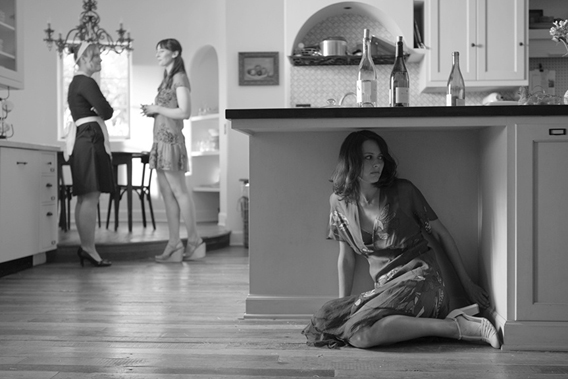 Amy Acker as Beatrice in Much Ado About Nothing
Amy Acker as Beatrice in Much Ado About Nothing Courtesy of Lionsgate
Joss Whedon?s adaptation of Much Ado About Nothing was filmed over the course of 12 days at Whedon?s Los Angeles home during a contractually required break between the shooting and post-production of his last project, the gargantuan superhero clustercuss that was The Avengers. As a kind of professional palate cleanser, Whedon and his wife Kai Cole, a producer, decided to get some friends together and whip up a secretly filmed, black-and-white, micro-budget adaptation of one of Shakespeare?s most beloved and oft-performed comedies. (If you made it through high school without having to memorize one-half of the big Beatrice/Benedick love scene for an audition piece, you must not have been a real drama person.)
Many of the actors assembled on Whedon and Cole?s rambling, terraced lawn were regulars from Whedon?s past TV shows?Buffy the Vampire Slayer, Angel, Dollhouse, Firefly?or from the movies and Web series he?s moved on to create since. Their degree of experience performing Shakespeare varied widely: Alexis Denisov (who plays Benedick, the male lead) had worked with Mark Rylance at the Royal Shakespeare Company, while Jillian Morgese (who plays Hero, the female second lead) first came to Whedon?s attention while running away from an explosion as an extra on the set of The Avengers. This combination of let?s-put-on-a-show camaraderie and differing levels of classical training could easily have made this feel like a smug vanity project: not every dinner-party experiment among friends is something that needs to be filmed and distributed. But if you were approaching the Whedonization of Shakespeare with trepidation, go ahead and convert all your songs of woe into hey-nonny-nonny, because this Much Ado About Nothing?while perhaps not an adaptation for the ages in every respect?is as bracingly effervescent as picnic champagne.
Champagne is only one of the liquids quaffed in abundance by the denizens of this movie?s modern-day Messina. Whenever a bit of business is needed, a character opens another bottle of red or pours another round of shots (with no visible effect on anyone?s sharpness of wit or clarity of enunciation?proof that we must indeed be in paradise). The house where the governor, Leonato (Clark Gregg), hosts his guests, Prince Don Pedro (Reed Diamond) and his villainous brother Don John (Sean Maher) is the site of a nonstop, well-lubricated garden party. (It?s also a singularly enviable, light-flooded piece of real estate, designed by Kai Cole, who trained as an architect.) After the royal brothers arrive with their retinue, romantic complications begin to pile up: one of Don Pedro?s young officers, Claudio (Fran Kranz) falls in love at first sight with Hero (Jillian Morgese), the daughter of the governor. Another officer, Benedick (Alexis Denisov)?a cranky sworn bachelor?meets up for the second time with Hero?s tart-tongued cousin Beatrice (Amy Acker). Right there in Act I, Scene 1, the two of them fall into what the audience immediately recognizes as screwball dialogue, 400 years avant la lettre. They can?t stand each other, so they must be destined to fall in love.
Much of the rest of Much Ado exists as a delivery system for the Beatrice and Benedick scenes?delicious putdown-fests that, as often as not, turn into signifying matches between male vanity and female subversion. But though it?s not among the works traditionally classified as ?problem plays,? Much Ado does present a thorny problem for the modern adapter. The play?s central conflict involves the disputed virginity of bride-to-be Hero, whose betrothed, Claudio, rejects her at the altar with a stream of scathingly misogynist invective, having been misled by villains into believing that ?savage sensuality? has reduced his seemingly chaste beloved to ?a rotten orange? (or, as his even less kind friend Don Pedro puts it, ?a common stale?).
There?s something about this pivotal dramatic scene?a bunch of men screaming at a young bride about her supposed sexual impurity until she faints dead away from shame?that?s hard to square with the modern, sexually free world in which Whedon?s characters seem to exist. (A dialogue-free opening flashback even shows Benedick sneaking out of Beatrice?s bedroom after a one-night stand, implying that the enmity between them springs in part from a long-ago booty call gone wrong.) But if you can accept?uneasily?the is-Hero-a-slut? storyline as a convention of its time, the play still functions as a canny catalogue of the varieties of human romantic folly?and an ultimately utopian celebration of the power of love to transform skeptics into saps, be they 16th-century military officers or 21st-century filmgoers.
Not every actor speaks the speech quite as trippingly on the tongue as Hamlet might have wished, though Denisov and Acker strike verbal sparks as the prickly lovers. Many members of the supporting cast, from Clark Gregg as the bride?s father to Nathan Fillion as the dimwit constable, Dogberry, also do wonderful work, but this Much Ado is staged as a true ensemble piece. Whedon seems less interested in showcasing individual performances than in creating a collective atmosphere in which Shakespeare?s words can be shared (sometimes with music?the passage known as ?Balthasar?s song? is set to music composed by Whedon himself).
I suppose it would be possible to get snarky about the DIY appeal of a film made with what, for a director of Whedon?s success at least, amounts to pocket change. But I only wish more mega-successful directors would use their enforced vacations to self-finance small productions of Shakespeare in their own backyards (and that more directors without global franchises on their resumes were able to get projects on this scale funded and seen). Joss Whedon has made clear that he won?t participate in the next Avengers movie unless Robert Downey, Jr. takes part. Here?s hoping they both blow it off and instead make Richard III on a shoestring budget, with Downey in the lead.?
Source: http://www.slate.com/articles/arts/movies/2013/06/joss_whedon_s_much_ado_about_nothing_reviewed.html
obscura grok cirque du freak paul pierce pope joan pope joan strikeforce tate vs rousey
কোন মন্তব্য নেই:
একটি মন্তব্য পোস্ট করুন